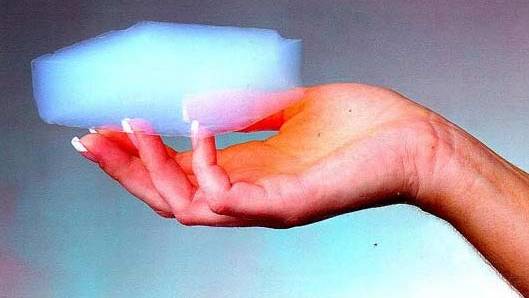NASA-inspired Aerogel could sponge up oil spills
Source: news.discovery.com
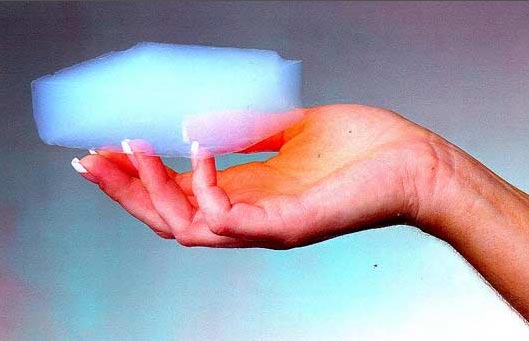
NASA-created aerogel, once used to capture comet dust, could soon solve more down-to-Earth problems.
Scientists from Ohio and Arizona are creating aerogels that can absorb oil from spills or stop pollutants from ever reaching the environment.
"It would be put on top of the water, where it will float on the surface and absorb oil and then, just like a kitchen sponge, you could squeeze the oil out," said Matt Gawryla, a scientist at Ohio-based AeroClay Inc.
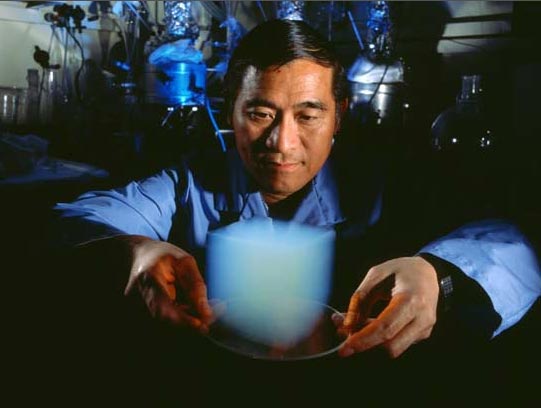
In this photo, Peter Tsou of NASA’s Jet Propulsion Laboratory holds up a sample of aerogel. Tsou worked with NASA’s STARDUST spacecraft to capture comet particles using the aerogel.
AeroClay is working to commercialize the aerogel technology originally developed at Case Western Reserve University.
Aerogel was originally developed decades ago for NASA space missions. It’s the least dense, most insulating material on Earth. It’s derived from a gel in which the liquid component is replaced with a gas. Even a thin coating of aerogel can dramatically improve a building’s energy efficiency or stop a blowtorch from igniting a match.
Over the last several years, new manufacturing methods have pushed the price of aerogels down to more earthly levels. Aerogels are now cheap enough to insulate some homes and businesses and be used in high-end sporting equipment, such as tennis racquets.
Superior insulation isn’t aerogel’s only quality. Aerogel can also be made to attract and hold oil and water. Two groups of scientists are trying to commercialize aerogel’s water- and oil-absorbing properties.
AeroClay is in the beginning stages of testing a prototype aerogel sponge, among other aerogel products. An aerogel sponge can soak up water and oil; which one it soaks up depends on the aerogel’s chemistry.
By modifying the different polymers that keep aerogel from collapsing in on itself, scientists can program which liquids or particles the material picks up.
An aerogel sponge could clean up oil covering rocks and birds like a kitchen sponge, but AeroClay’s executives primarily have another use in mind; stopping oil from reaching the shore in the first place.
Large sheets of aerogel could be placed at the source of the oil leak and absorb more oil faster. Once the sponge is filled with oil, the pad would be removed, the oil squeezed out and stored for future use, and the sponge could be put back in the water to absorb more oil.
AeroClay’s technology isn’t mature enough to clean up the oil slick threatening the Gulf coast, said Lauren Wolf, AeroClay’s CEO. Within several years the company hopes its aerogel technology could help clean up oil slicks, but the company has no plans to deploy aerogel prototypes for the current clean up.
Another group of scientists is developing aerogels to stop pollutants from leaching into nature in the first place. Robert Pfeffer, a scientist from Arizona State University, is looking to use aerogels in industry to remove harmful particles and chemicals. Breaking a solid piece of aerogel into tiny particles increases the aergol’s surface area, allowing it to absorb more chemicals than a flat sheet.
At metal plating facilities, coal-fueled power plants and other factories, waste air and water need to be filtered to remove any contaminants. Waste air or water would be pumped into a container filled with loose aerogel particles. The force of the air would suspend the particles in mid air, exposing every surface of them to absorb harmful particles. The aerogel particles, saturated with contaminants, would then be collected and stored in a safe facility.
"Removing chemicals and oils from water and from the air is a major problem," said Pfeffer. "Aerogels are an excellent material to act as a sorbent for these materials."
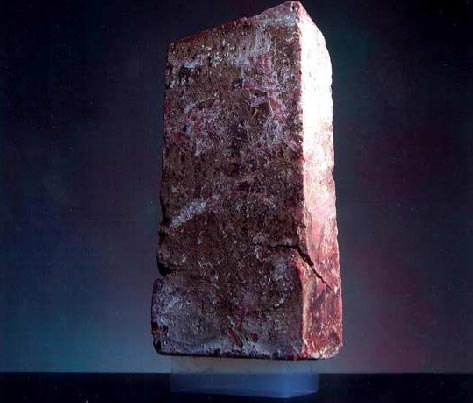
This material is not only lightweight, but also strong and durable. Here, a small, 2-gram sample of the aerogel is supporting a brick that weighs 2.5 kilograms (5.5 pounds) -- more than 1,000 times the weight of the sample.
Aerogel is so strong that it has been used to develop artificial muscles. It has also been used in a range of other applications from tennis raquets to fuel cells and more.
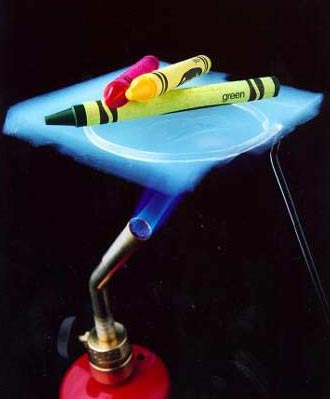
Aerogel is both the least dense and the most insulating material on Earth. Even these crayons stay solid against the heat when insulated by the aerogel.
Although this technology is cutting edge, new manufacturing techniques have made the aerogel more affordable. So while this aerogel can certainly make for some interesting experiments in a laboratory setting, it has already been used as insulation in homes and businesses.
Article from: news.discovery.com
Images: NASA
Human Hair and Mushrooms help with oil spills
Video from: YouTube.com
Demonstration how hay can clean up oil
Video from: YouTube.com
